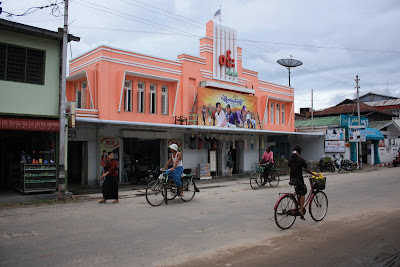Thazi, it turned out, is a little junction town along the Yangon-Myitkyina train line, with a spur shooting out eastwards into Shan State and a north-westerly loop up to Mandalay. Being a junction town is ostensibly the source of its crooked reputation: entrepot for contraband and haven for hoodlums. One can only imagine an inglorious history chock-full of traffickers and stash-houses, proscribed goods from the country's vast hinterlands passing through Thazi en route to yonder ports and border crossings. But I wouldn't know anything about that stuff. I only came with the intention of documenting some movie theaters. What I found in Thazi was architectural gold in vernacular form, plus one of the most fascinating glimpses into the social life of the cinema I've ever seen.
 This is Thazi's lone cinema, the Soe San, the first cinema I encountered in Myanmar that was made mostly of wood. Thazi is such a small place that the Soe San Cinema only warrants screening films once every other evening. There's simply too few movie-going residents in town for more than that. But the Soe San offers alternatives to its lack of theatrical regularity. Walk around to the rear of the auditorium to find an attached VCD rental shop, along with a snooker hall. At the front end of the Soe San is a long, narrow room with a projection television mounted on the wall. This room, approximating a mini-theater, is for broadcasting football matches.
This is Thazi's lone cinema, the Soe San, the first cinema I encountered in Myanmar that was made mostly of wood. Thazi is such a small place that the Soe San Cinema only warrants screening films once every other evening. There's simply too few movie-going residents in town for more than that. But the Soe San offers alternatives to its lack of theatrical regularity. Walk around to the rear of the auditorium to find an attached VCD rental shop, along with a snooker hall. At the front end of the Soe San is a long, narrow room with a projection television mounted on the wall. This room, approximating a mini-theater, is for broadcasting football matches. Every Myanmar aficionado I spoke with prior to departure clued me in to the proliferation of the football dens. They often serve as substitutes for movie theaters in towns too small to support one. In Thazi, however, the football den is included in the Soe San Cinema, making it an all-in-one entertainment center.
Every Myanmar aficionado I spoke with prior to departure clued me in to the proliferation of the football dens. They often serve as substitutes for movie theaters in towns too small to support one. In Thazi, however, the football den is included in the Soe San Cinema, making it an all-in-one entertainment center.My night in Thazi coincided with day three of the 2010 FIFA World Cup. The Soe San's football den was in full swing on account of it, with matches broadcast live from Johannesburg via satellite. Almost all the seats in the six or seven rows of benches were occupied when I arrived. An exclusively male audience sat silently imbibing the game, while smoke from their cigarettes and cheroots twisted up to the ceiling. A kindly young manager, who could speak a lick of English, let me set up my camera and tripod at the rear of the den, noticed but otherwise ignored by the preoccupied crowd. It was a photographer's delight.
 On the right hand side of the above photo, a monk can be observed watching World Cup football in the Soe San Cinema's football den.
On the right hand side of the above photo, a monk can be observed watching World Cup football in the Soe San Cinema's football den.In many ways Myanmar's football dens are the local equivalent to pubs in terms of watching a sporting event. The difference being that for many of Myanmar's football fans there simply are no other options. It's either pile into the football den or don't watch at all. This is generally how it's done in a country where the average household lacks any electrical appliances, if they have electricity at all.
Another interesting facet of Myanmar's football dens is that they serve as a link to the wider world for a people largely cut-off from it. Viewing something as seemingly routine as a football match broadcast from England or South Africa constitutes a major break from the strictly local perspective most Myanmar get. There's an inverse to that equation, however.
For juggernauts like the European football leagues, their products get to be seen by even the most remote denizens of one the world's poorest countries. Whenever the trade sanctions against Myanmar are lifted, brands with a televised presence will likely enjoy a competitive advantage in this new market. Transnational corporations hawking football-related products will get rich while the football dens that introduced them disappear. Such is the way of the world.





















































